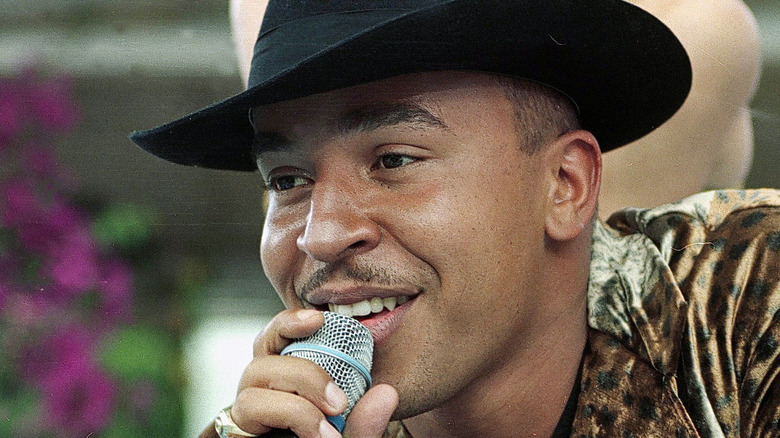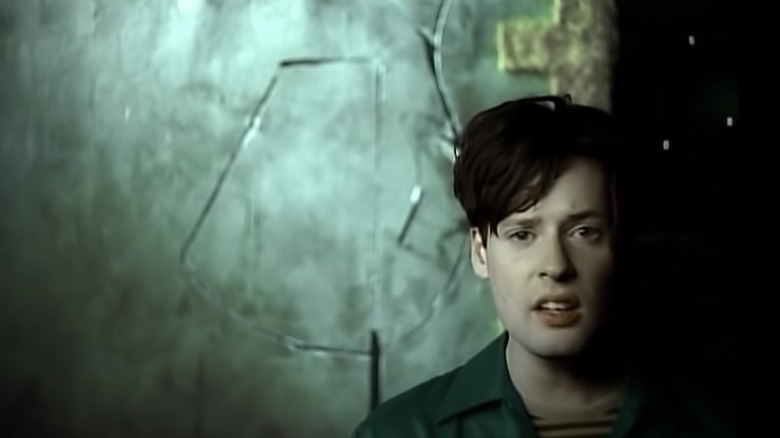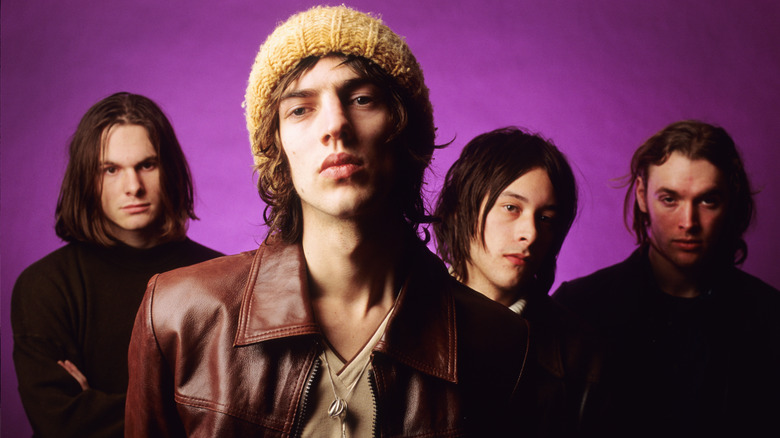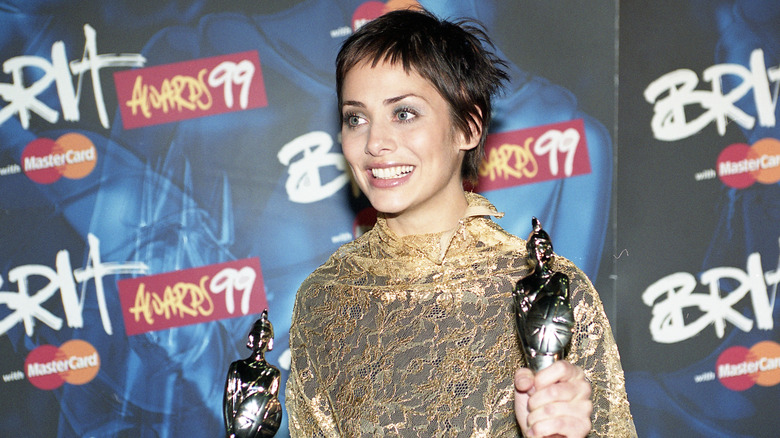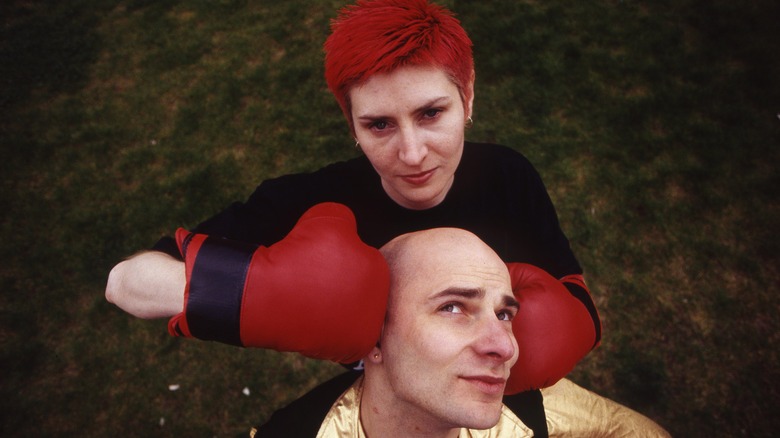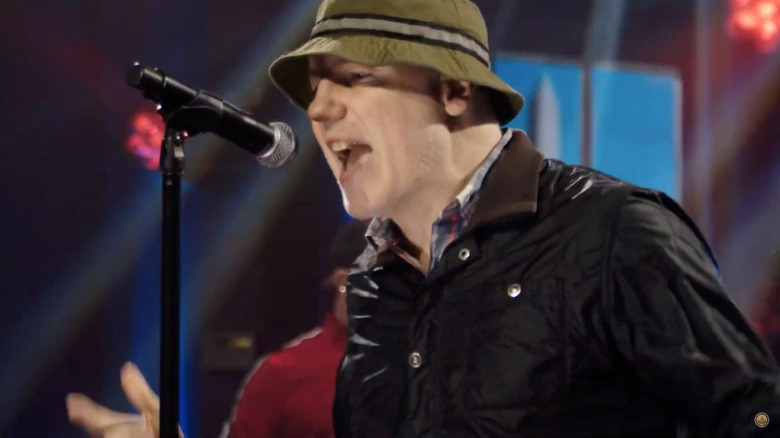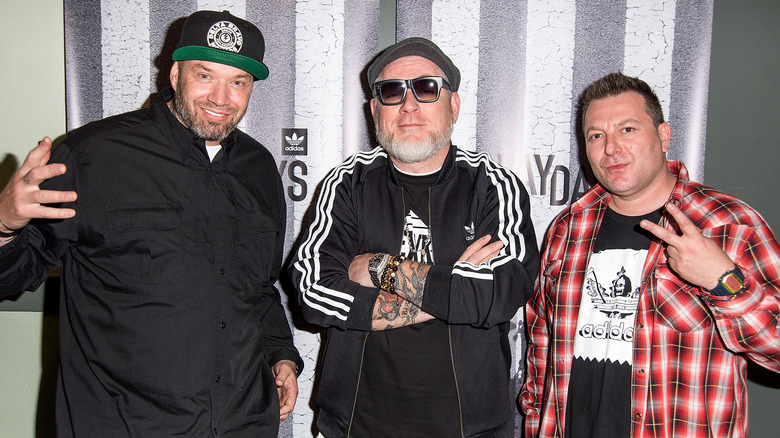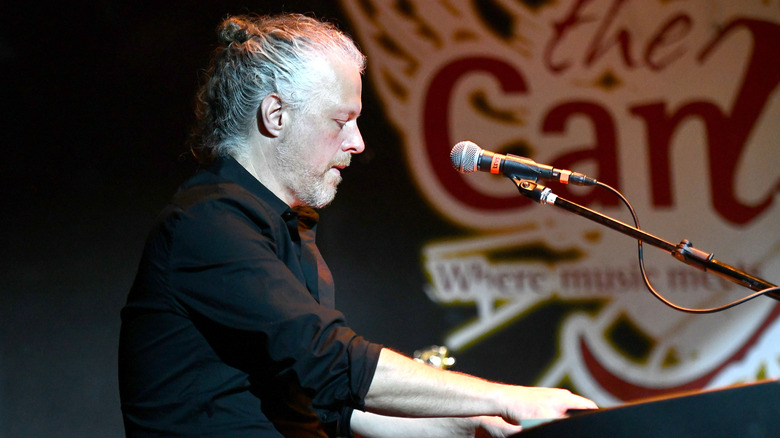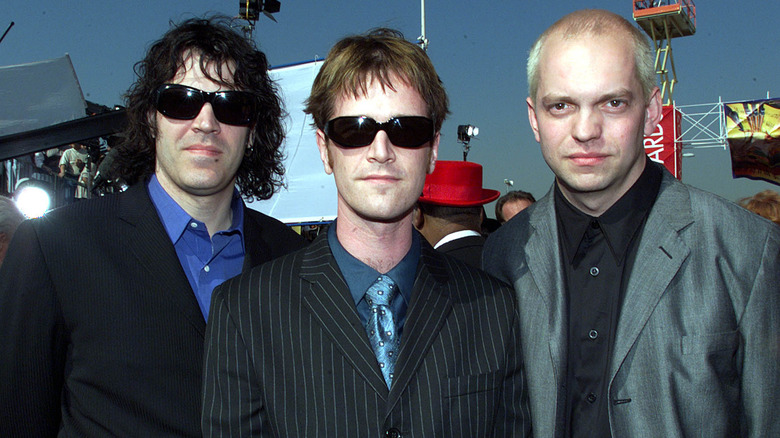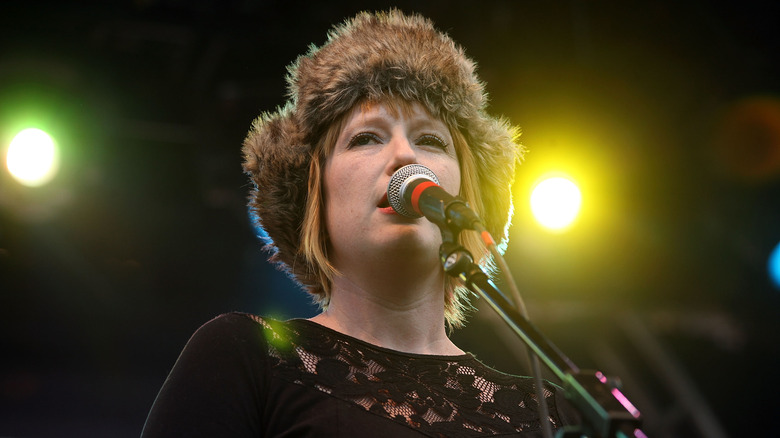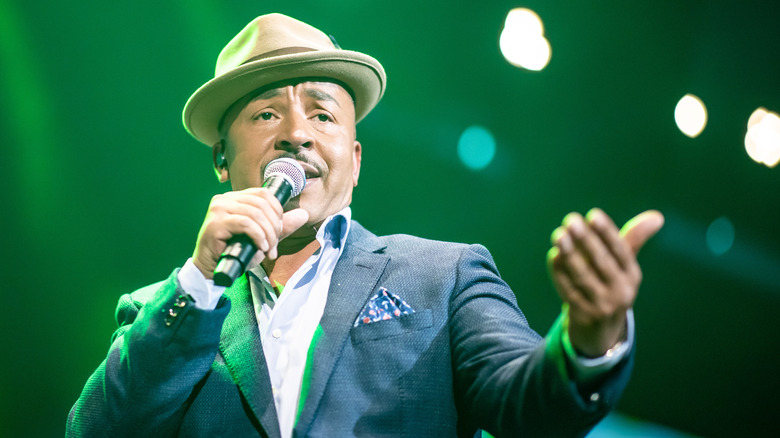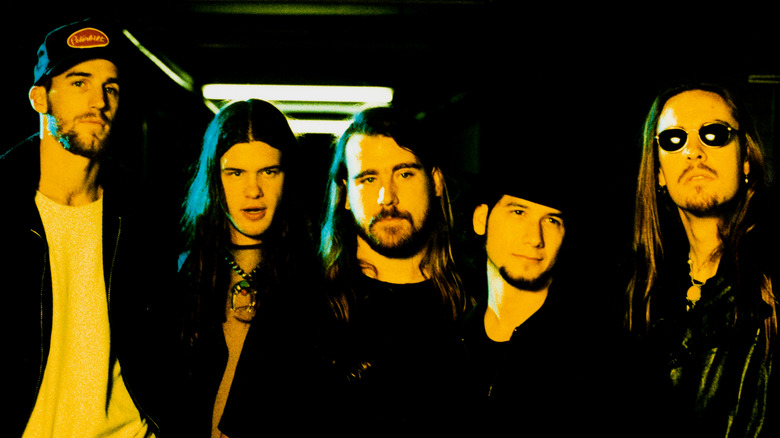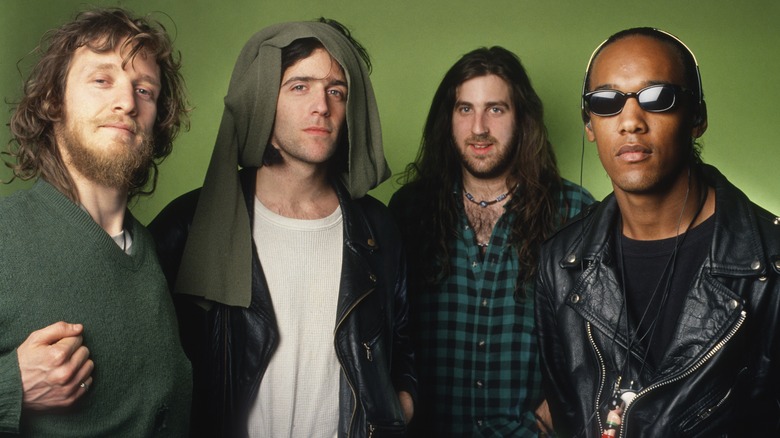What Happened To These '90s One-Hit Wonders?
There's something so intriguing about one-hit wonders. These songs are like comets, shining with a burning intensity for a short time — only to fade out and leave us with memories of their beauty. Lucky for us, one-hit wonders can be played at our convenience, allowing us to revel in their glory. A decade that had some of the best one-hit wonders to put on repeat? The '90s. Alternative, grunge, hip-hop, pop — music in the '90s was fresh and diverse, giving room for new talent to emerge and make their names known. Some groups made it big in the '90s ... and some acts made it big for a short time, with one song. Makes you wonder: What happened to them after their five seconds of fame?
Well, they didn't disappear off the face of the earth. In fact, you may be surprised just how much these '90s one-hit wonders have been up to since their smash hits debuted.
Marcy Playground
"I smell sex and candy here, mmm ..." Anyone who had a pulse in the late '90s heard this unmistakeable chorus opener from Marcy Playground's hit "Sex and Candy." The catchy crossover tune caught listeners' attention with its peculiar lyrics (has anyone figured out what disco lemonade is yet?) and mellow sound, sending the song to No. 1 on the Billboard Alternative Airplay chart in 1997 and No. 8 on the Billboard Hot 100 chart in 1998. The song was everywhere, and it looked as though Marcy Playground was poised to be a staple band in the post-grunge scene — they even toured with bands like Fastball, Toad the Wet Sprocket, and Everclear (via News-Times).
Alas, the post-"Sex and Candy" craze wasn't all that sweet for the alt rockers. Their songs "Sherry Fraser" and "Saint Joe on the School Bus," off the same album as "Sex and Candy" (via Discogs), failed to gain steam. Their sudden mega success also contributed to some burnout. In an interview with News-Times, lead singer John Wozniak said of the "Sex and Candy" wave, "It just got to the point where it was too overwhelming." That's not to say the band stopped making music altogether, though — they released four albums following their debut. The latest one, "Lunch, Recess, and Detention," was released in 2012 (via marcyplayground.net), and the band is still actively touring. "Sex and Candy" remains their most successful song to date.
The Verve
British alternative rockers the Verve (not to be confused with the other one-hit wonder '90s band, the Verve Pipe) achieved major success in the U.K. and across the pond in the States with 1998's "Bitter Sweet Symphony," a track that reached No. 12 on the U.S. Billboard Hot 100 chart (via Songfacts). The song earned the band a Grammy nomination in 1999, and its music video, featuring singer Richard Ashcroft practicing some awful sidewalk etiquette, earned several VMA nominations (via IMDb). The band's big hit had come, and it seemed as though more hits were on the horizon — but, alas, "Bittersweet Symphony" would be their only smash global hit.
So, what happened to the Verve? Well, according to MTV, they broke up in 1999 (for a second time in their career) but got back together in 2007 (via the BBC) before breaking up for good in 2009 (via The Guardian). Needless to say, their working relationship was tumultuous. And, of course, getting sued didn't help matters. According to the BBC, the song was the subject of a complicated copyright lawsuit brought on by former Rolling Stones manager Allen Klein, which resulted in the band losing their royalties and publishing rights to the tune. Those royalties were given back to Ashcroft more than two decades later, in 2019. But if your '90s heart is dying for a Verve reunion, don't hold your breath. As NME reports, some band members don't even talk to one another anymore.
Natalie Imbruglia
If you were so done with your relationship back in the late '90s, there's a good chance you had Natalie Imbruglia's cover of "Torn" playing on repeat in your Walkman. The Australian actress-turned-singer achieved global recognition at the tender age of 22 after the angsty pop tune took the top spot on Billboard's Adult Pop Airplay chart in 1998 and made itself home for a solid 14 weeks. Not a bad run, right?
Well, the run slowed and the "Torn" era eventually ended — and, according to The Irish Times, Imbruglia was feeling the pressure to deliver a dynamite follow-up. She released several albums throughout the 2000s and into the 2010s (via All Music), but none of her tracks reached the same level of success as "Torn" did. And, she experienced a nearly career-ending hurdle in the years following "Torn." According to ABC News Breakfast, Imbruglia had a serious case of writer's block that lasted years. She took time away from music, became a mother, and came back to music with her sixth studio album, "Firebird," released in 2021.
Alright, '90s kids, we know you're wondering how she feels about the smash hit that put her on the map. As ABC News Breakfast reports, Imbruglia still performs the song and says she's grateful for what it's brought into her life.
Chumbawamba
You know a band will deliver something memorable with a name like Chumbawamba. The Brit rockers struck gold with their 1997 song "Tubthumping," giving us the classic lyrics "I get knocked down, but I get up again, you're never gonna keep me down." The fun, nostalgia-triggering track reached No. 6 on the Billboard Hot 100 and catapulted to No. 1 on the Pop Songs chart, where it made itself comfy for nine weeks (via Billboard). With that kind of traction, it felt as though the band, who had been together since 1982 (per Rolling Stone), was on the fast track to a career filled with chart-toppers. However, the endearing "Tubthumping" would end up being the band's biggest hit, cementing its status as one of the funnest one-hit wonders of the '90s.
What happened to Chumbawamba post-"Tubthumping"? They made more music, and used their tunes to highlight political and social issues over the years. But, as the saying goes, all good things must come to an end. According to Rolling Stone, Chumbawamba broke up in 2012. There's no bad blood between bandmates, though, and '90s music enthusiasts haven't seen the last of the band. According to NME, former lead singer Dunstan Bruce made a documentary about Chumbawamba, but its release date is TBD.
New Radicals
Eternally optimistic '90s kids remember the grip "You Get What You Give" had on their stereo systems. Alt-pop rockers New Radicals released the mega hit in 1998, when it made itself home on charts across the globe and earned serious kudos from musicians like Joni Mitchell and The Edge from U2 (via The Hollywood Reporter). You can't help but smile while listening to this delightful dig as frontman Gregg Alexander sings about not giving up, corporate hypocrisy, and calling out famous '90s acts like Courtney Love and Marilyn Manson. It's the best kind of ear candy — sweet, but also packs a punch.
New Radicals were poised for a top-charting career following the success of "You Get What You Give," but that all changed in July 1999. According to The Hollywood Reporter, that's when Alexander broke up New Radicals. The reason? He was feeling disenchanted by the concept of celebrity and corporate success. And just like that, New Radicals' bright '90s light was blown out.
However, that light was relit in January 2021 when the band reunited after 22 years to play "You Get What You Give" to celebrate President Joe Biden's inauguration (via Rolling Stone). The song has a special meaning for the president, as it was one he and his family would rally around while his late son, Beau, fought his battle with glioblastoma. According to Rolling Stone, Alexander said performing the song was a "huge honor."
House of Pain
As soon as you hear the intro to House of Pain's "Jump Around," you know you're in for a good time. The 1992 party hit skyrocketed to the No. 3 spot on U.S. charts (via Songfacts) and charted across the globe. The infectious hip-hop crossover hit had people flocking to the dance floor to, you guessed it, jump around and let loose. House of Pain became the country's favorite Irish-American hooligans, dishing out a party and rally anthem that's still played at sporting events and bars.
The trio, consisting of DJ Lethal, Danny Boy, and Everlast, collaborated to create an epic summer hit — but, turns out, it would be the only huge hit House of Pain would have. According to Songfacts, the group's follow-up singles failed to chart as highly as "Jump Around" did, and their 1994 and 1996 albums didn't make waves. And, according to Everlast (in an interview with The Aquarian), the group was plagued with personal issues that led to an unhappy atmosphere. As CNN reports, Everlast left the group in 1996. He went on to have a successful solo career, DJ Lethal joined a little band called Limp Bizkit, and, according to Page Six, Danny Boy battled drug addiction until he got clean in 2005. House of Pain have reunited on and off to play shows over the years, and all three members were part of the hip-hop supergroup La Coka Nostra, which Danny Boy and DJ Lethal are still part of.
Tal Bachman
Canadian crooner Tal Bachman took over the airwaves with 1999's "She's So High," a catchy pop number that anyone who's thought their significant other is out of their league can relate to. The song reached No. 1 on Billboard's Adult Pop Airplay chart in September 1999, and it peaked at No. 14 on the Hot 100 chart that year. And who could forget that music video that features the flying girl?!
Bachman's ode to admiration made a powerful impression on late '90s pop, but his other works weren't as commercially successful. He released a second album in 2004 (via Discogs), but he's mostly laid low in the years since his '90s one-hit wonder was released. Oddly enough, "She's So High" was back in mainstream consciousness in 2019 after it was featured in a Peloton holiday ad that had the internet feeling ... some kind of way (via Songfacts). Variety reports that, while that ad was going viral, Bachman was in talks with Netflix about creating a show — but there's no word on the show's fate.
Semisonic
Ah, yes — the song that perfectly sums up every bar's last call. Alternative rock group Semisonic unleashed a huge '90s hit with 1998's "Closing Time," which hit No. 1 on the Billboard Alternative Airplay chart in the U.S. and reigned there for five weeks. The song, both a catchy way to get patrons to finish their last drink and a metaphor for entering the world (via Songfacts), put Semisonic on the late '90s pop-rock map. All that success ... and then poof, Semisonic seemed to disappear off the face of the planet.
What happened? Well, as Entertainment Weekly reports, the band didn't "break up," necessarily — they just stopped playing music in the early 2000s. One of the reasons is that lead singer Dan Wilson wanted more time to care for his daughter (via Rolling Stone). He hasn't been completely out of the music scene, though. According to Rolling Stone, he's written songs along with, or for, several music powerhouses over the years, including the Chicks, Taylor Swift, and Adele.
After laying (mostly) dormant for almost 20 years, Semisonic got the band back together and released a new EP in 2020, bringing that nostalgic '90s pop-rock sound to the 21st century (via Rolling Stone). The band is still playing together and, according to their website, they're slated to play two sold-out shows in Minneapolis in January 2023.
Sixpence None the Richer
1998's pop-folk-rock tune "Kiss Me" by Sixpence None the Richer was the song to slow-dance to at any late '90s high school dance. The dreamy romantic anthem wasn't solely a hit with love-stricken teens, though — Billboard named it one of the best songs of 1999, it reached No. 2 on the Billboard Hot 100, and earned a Grammy nomination. With such a successful track under their belts, Sixpence None the Richer seemed poised to dominate the charts with other sweeter-than-pie pop tunes. Their covers of "There She Goes" and "Don't Dream It's Over" made some splashes, but they didn't match the tsunami of success that came with "Kiss Me."
The band released an album in 2001 (via Discogs), and three years later, the group disbanded (via CNN), with singer Leigh Nash and guitarist Matt Slocum focusing on different areas of their lives following the split. Alas, the music eventually called them back. As Billboard reports, the group reunited and released an album in 2008. Another album followed in 2012, but they haven't released a new record since.
Lou Bega
Need a little bit of Monica in your life, or a little bit of Erica by your side? If so, turn on Lou Bega's cover of "Mambo No. 5." The German singer graced us with this hit in 1999 and it delivered, reaching No. 3 on the Billboard Hot 100 in November of that year after an impressive run on global airwaves over the summer (via All Music). It's one of the most iconic songs of the '90s, filled with jazz and mambo riffs that make people flock to the dance floor. The song's global success seemed like the perfect career tee-up for Bega — turns out, it had the opposite effect, with "Mambo No. 5" still being his only chart-topping song to date.
Not that Bega didn't try to replicate the success of the song, though. As All Music states, he released albums in 2001, 2006, and 2010, but none of their tunes ignited that same spark that "Mambo No. 5" did back in '99. The albums may not have been massive commercial successes, but that didn't stop Bega from touring and performing his beloved '90s song in front of audiences.
Now, you may wonder — how does Bega really feel about his one-hit wonder? According to Vanity Fair, he debated that question for a bit. But at the end of the day, he's all for "Mambo No. 5" and is grateful for everything it's brought him.
Blind Melon
Alternative listeners got a whimsical breath of fresh air in 1992 with Blind Melon's "No Rain," an indie-folk track that put the band on the map in several ways. For starters, it was accompanied by a music video that introduced the world to the "Bee Girl," a sweet kid who became a slight pop culture obsession. And then there was its global commercial success, with the song reaching the No. 1 spot on several rock charts (via Songfacts). The group was already touring, but the success of "No Rain" and their debut album led to more road time (via Louder Sound) and the making of their sophomore album, 1995's "Soup."
Touring, while great for Blind Melon's promotion, had its downsides. According to Ultimate Classic Rock, singer Shannon Hoon struggled with drug addiction during the band's intense touring schedule and sudden catapult into the mainstream. He tried to get sober several times, but unfortunately, those stints didn't stick. And despite Hoon's addiction issues, Blind Melon kept touring to promote "Soup." Sadly, during that tour in October 1995, 28-year-old Hoon died on the band's tour bus after overdosing on cocaine, forever changing the group (via Louder Sound).
According to the band's website, surviving members of Blind Melon spent years trying to find a new lead singer, to no avail. The band broke up in 1999, but got back together in 2006 with a new singer. They released an album in 2008 (via Guitar World) and put out several songs in 2021.
If you or anyone you know needs help with addiction issues, help is available. Visit the Substance Abuse and Mental Health Services Administration website or contact SAMHSA's National Helpline at 1-800-662-HELP (4357).
Spin Doctors
Armed with a feel-good melody and a story of princely proposals, "Two Princes" by Spin Doctors grabbed the attention of both pop and alternative listeners. The song went to No. 7 on the Billboard Hot 100 chart in 1993 and earned the band a Grammy nomination. Their first album, "Pocket Full of Kryptonite," (which featured the semi-successful song "Little Miss Can't Be Wrong") was a huge success, going an impressive five times Platinum (via 48 Hills).
A killer album, and a catchy crossover soaring on the charts — seems like Spin Doctors were destined to release more hits with that kind of start. However, their follow-up album, 1994's "Turn It Upside Down," failed to pick up mainstream attention. From there, Spin Doctors hit a bit of a rough patch.
According to 48 Hills, guitarist Eric Schenkman quit the band (right in the middle of a California performance) in 1994. Bassist Mark White left in 1999 — the same year lead singer Chris Barron experienced a serious vocal condition that jeopardized his singing career. Barron prevailed, though, and the original lineup played together again in 2001 as part of the last hurrah for Wetlands Preserve nightclub in New York City (via jambands.com). The band released three albums after that reunion (via All Music), but according to jambands.com, they parted ways with White after he chose not to get the COVID-19 vaccine. White's Instagram bio currently reads "Former bass player for the Spin Doctors because I refuse to get vaccinated."
